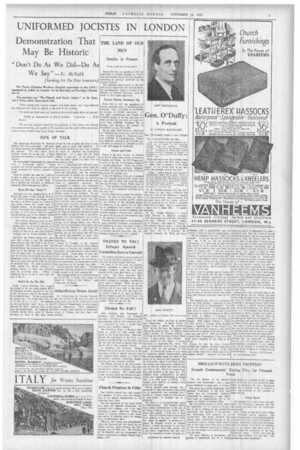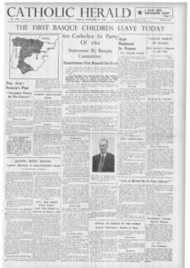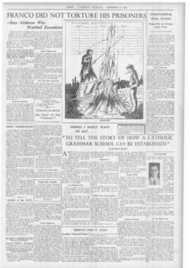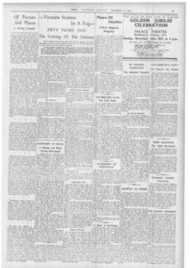Page 3, 12th November 1937
Page 3

Report an error
Noticed an error on this page?If you've noticed an error in this article please click here to report it.
Tags
Share
Related articles
Gen. O'duffy Accuses Capt. Mccullagh And Efen S Rich Brigade
" In Franco's Spain "
Open Town Bombing Regular Practice Of Reds
European War
Letters To The Editor
Gen. O'Duffy:
A Portrait
By CAPTAIN McCULLAGH
Capt. McCullagh's Reply to Gen. O'Duffy SIR,—General O'Duffy says that Capt. MeCullagh's present reliability as a writer can be judged by the following extracts from his articles: " General OThiffy is a benevolent out gentleman of 65 years." " President de Valera sent Father Kearney, an Trish clergyman of Madrid, to Salamanca, to bring home all the Irish who wanted to go,"
Those extracts are not from articles; they
are from a cable in the New York Times, or, rather, from a summary in the Irish papers. In the carbon copy of my despatch, the passages quoted read thus:
O'Duffy showed himself good organiser, indefatigable despite his 65 years, thrice a week he motored from the Front to Caceres and back looking after commissariat. wounded, organization, mails, iiinutaimenta, everything affecting men's we fare. . . . Valera sent Kearney, Irish Mini er to Madrid, to Salamanca." etc., ete., e As the General mentions first the mistake about his age, that is evidently the
head and front of my offending. I meant to be complimentary, and to contrast his advanced years with his tireless activity, but he detected in my words a sarcasm which was not there. Het is, 1 understand,
a mere boy of about fifty. I humbly apologise.
As for " Father Kearney," I wrote " Irish Minister to Madrid," meaning " Irish diplomatic representative," but New
York took " Minister " to mean " Minister of religion," and made it " Father." This mistake was not mine. 1 know Mr, Kearney well. having met him in Dublin and Paris. Mr. E. J. Riordan, Mr.
Vaughan Dempsey, Mr. Blyth, and many
other residents of Dublin will corroborate me.
These, Mr. Editor, are days of stupen
dous happenings. In Spain, Franco is getting ready to deliver the knock-out blow. In the Far East, the Japanese are altering the map of Asia. In Dublin, the mighty intellect of General O'Duffy is brooding over the problem of Rory O'Sul
livan. I plead guilty, mon General. I throw myself on your mercy. I confess that Rory is a masculine Mrs. 'Arris. To use the memorable words of Mrs. Gamp, " There aient no sich persing " of that name. I invented the name so as tosave my informant possible inconvenience, and that did not matter much, for many of the names in the Bandera were assumed. But the Irish soldier whom 1 call Rory O'Sullivan existed, and I have given a faithful picture of what he looked like, what he said, and what he did. Dozens of names in my book are invented in the same way. For example, every correspondent in Spain knows who Captain Bustamente is, though there is no such name at G.H.Q. I refrained, from motives of delicacy, from giving his real name.
Having assumed, quite wrongly, that I am hostile to him, the General casts about for an explanation, and concludes that 1 wanted to revenge myself on him because he had failed " to facilitate me as a journalist."
This theory is a misapprehension, based on hallucinations. The General suffered from similar hallucinations in the case of de Valera, Cosgrave, Cronin, Belton, and a dozen other people. I shall refer to them later. One of the hallucinations from which he is suffering in my case is that I wrote him "pages of appeals " to permit me to attend the Brigade reviews by General Franco. I made that request in one short letter, and never wrote him another, but, in his ardent imagination, that one short letter has expanded to pages and pages, has multiplied itself a hundredfold, and has become a litany of piteous supplications.
I did not bombard him with "persistent requests." I did not beg him to " facilitate " me. I did not ask for military information, as I knew that he had none that would be of the faintest use to anybody, for his military ideas date from the Battle of Vinegar Hill. I did not worry him for news any time he passed through Talavera: 1 only greeted him as the G.O.C. of an Irish detachment where I had many friends. Once, at Talavera de la Reina, I asked him verbally if he could bring me out to Ciempozuelos, and he promised to do so, but never did.
That I have no grudge against General O'Duffy is proved by the fact that I write of him with absolute impartiality in my
book. An Irishman who says that he worked with him and knows him well, but who is unknown to me, declared in the Catholic Herald last week that my portrait of him was " accurate and lifelike. It was just the man as we have known him from long and intimate experience here in Ireland."
The General says that my association with the Irish Brigade " consisted of one visit to the front at Ciempozuelos." This also is an hallucination. I visited the Brigade twice in Caceres. In Badajoz I was called upon by General Eamonn A. Horan of Tralee, to address a contingent of seventy Irishmen, drawn up in the Plaza de Espana. With Captain Thomas F. Smith I went aboard a steamer which brought about a hundred men of the Brigade to Lisbon, and on that occasion I was asked to write my autograph in the note-books of the men, and did so. With my old friend, Captain Sean Cunningham, I went over all the sector occupied by the Irish at the Front.
During the past ten years, General O'Duffy has violently attacked friend after friend who tried to help him. A list of such victims would fill a whole page of the Catholic Herald. Surgeons say that the endocrine gland is responsible for such a condition, and that the General himself should be excused. He has quarrelled with Cosgrave, with de Valera, with Mr. P. Belton, head of the Irish Christian Front, with Commander Cronin, once his Chief of Staff in the Blueshirt movement, with all the best officers and men whom he brought to Spain. The names of some of those officers will be found in the Irish Press and the Irish Times of June 22. Others with whom he has quarrelled, are now in Spain, or if in Ireland, prefer to remain silent.
He even started a terrific row with the officials who were examining his baggage at the North Wall, when he landed in Dublin on his return from Spain; and instead of striking a lofty and inspiring note, his speech at the Mansion House on that occasion consisted in a violent attack on the Government for having him searched. In England, he would have been arrested for obstructing public servants in the discharge of their duty.
Among those who welcomed him at the Mansion House was Mr. Belton, the head of the Irish Christian Front, who has spent his time. his health, and tens of thousands of pounds in assisting Franco's Red Cross. But, inside of a month, General O'Duffy had gone bald-headed for Mr. Belton because of a hallucination that Belton had promised to devote himself exclusively to the Irish Brigade. Mr. Belton's reply can be read in the Irish Press of August 11. It is a merciless and well deserved castigation, of which 1 shall quote only one sentence: " The abject failure of his Spanish adventure and his deliberate and callous attempt to put the blame for its failure on others, make co-operation with him impossible."
The one benefactor with whom General O'Duffy has not quarrelled is General Franco, and this circumstance raises the Generalissimo enormously in my estimation, for his success in soothing this most irritable of all Irishmen is a unique feat of statesmanship. FRANCIS McCutukota. 41, rue Cambon, Paris.
blog comments powered by Disqus

















